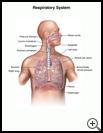
Hiccups
________________________________________________________________________
KEY POINTS
- Hiccups are sudden jerks, or spasms, of the diaphragm that cause a sound in your throat. Most of the time, hiccups are harmless.
- If a kidney problem or pneumonia causes hiccups, treating the medical problem may cure the hiccups. Medicines are sometimes prescribed to try to give relief.
- If you tend to have hiccups often, try to avoid the things that may cause them.
________________________________________________________________________
What are hiccups?
Hiccups are sudden jerks, or spasms, of the diaphragm that cause a sound in your throat. The diaphragm is a sheet of muscle between your chest and belly. The diaphragm muscle moves down to help you breathe in, and the muscle moves up when you breathe out.
Most of the time, hiccups are harmless. Hiccups usually start suddenly and stop after a few seconds or minutes. Hiccups that last longer than 48 hours or that keep coming back often are more serious.
What is the cause?
Most of the time you get hiccups because your diaphragm muscle is irritated by:
- Drinking something very cold or very hot
- Eating or drinking too fast and swallowing a lot of air
- Eating or drinking too much or eating hot and spicy foods or liquids
- Drinking alcohol or carbonated drinks
- Being very excited or nervous
Even a sudden change in temperature may cause hiccups.
Hiccups that don't stop and last for hours may be a sign of nerve problems or a chemical imbalance in the blood. This may cause your diaphragm muscle to move up and down too hard or too often. Other serious problems that can cause hiccups to last for a long time are:
- Kidney failure
- Pneumonia
- Injury or surgery to the chest
- Heart disease
How are they diagnosed?
Everyone has hiccups from time to time. Usually they need no diagnosis or treatment. But when hiccups last several hours, you should tell your healthcare provider. If you also have chest pain or belly pain that continues between the hiccups, you need to call your healthcare provider or 911 right away.
Your provider will ask about your symptoms and medical history and examine you. You may have blood and urine tests.
How are they treated?
The treatment depends on the cause. If a kidney problem or pneumonia causes hiccups, treating the medical problem may cure the hiccups. Medicines are sometimes prescribed to try to give relief. If you are being treated for hiccups that have lasted several hours or longer, follow your healthcare provider's directions for stopping the hiccups.
Sometimes gently pulling on your tongue will stop the hiccups. This affects the nerves that control the diaphragm.
How can I prevent hiccups?
If you tend to have hiccups often, try to avoid the things that may cause them, such as overeating, eating or drinking too fast, or drinking alcohol.

